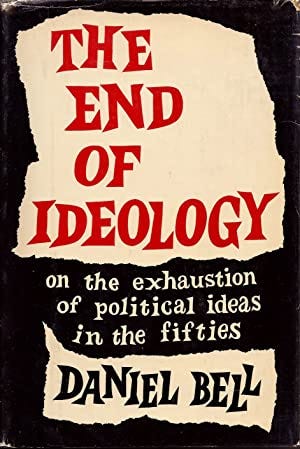How Ideology Works In The 21st Century
No ideology has not ended – it has merely been depoliticised
This is Part I of a series of essays on the theme of how ideology works and how the ruling classes seek to legitimate themselves
Ideology was supposed to have ended around the late 1950s and early 1960s. At least, that’s how most people interpreted Daniel Bell’s influential, The End of Ideology (1960). Later, to avoid being misunderstood, Bell claimed that his formulation of the ‘end of ideology’ was mainly a reference to the gradual unravelling of socialism and Marxism in the 1950s. Like most writers on the subject, Bell tended to interpret ideology through the prism of the interwar era when radical ideologies were in the ascendancy. With the dramatic disintegration of these radical political ideologies, it seemed to Bell and others that an era of bitter ideological conflict had ended. He wrote, ‘for the radical intellectual who had articulated the revolutionary impulses of the past century and a half, all this has meant an end to chiliastic hopes, to millenarianism, to apocalyptic thinking – and to ideology’[i].
Like many other commentators caught up in the zeitgeist of the Cold War, Bell perceived ideology as a radical political religion oriented towards realising some kind of utopia. For Bell, Marxism and communism served as the paradigmatic example of an ideology. He believed that these ideologies had become ‘exhausted’ and that ‘for the radical intelligentsia, the old ideologies have lost their “truth” and their power to persuade’[ii].
Bell’s thesis contained some important insights. The revolutionary and radical utopian and totalitarian ideologies – communism and fascism – became so exhausted that they lost the capacity to motivate the masses. Despite numerous attempts to lend the conflict between classes an ideological form, the politics of class never regained its previous status. Moreover, since the 1960s, the utopian hope and vision associated with radical politics have given way to a more pragmatic and realistic political style. Writing in the New Statesman in September 2004, Richard Reeves observed that ‘ideology is a dirty word in New Labour circles’ and added that ‘without ideology, the role of politicians is no longer to persuade, merely to sell’[iii]. This pragmatic, transactional and opportunistic political style has self-consciously distanced itself from ideals and appeared to vindicate Bell’s assessment of the demise of ideology.
The reason ideology acquired such a negative connotation was not simply because of its association with the failed political projects of the interwar era. Public life in western societies fell under the sway of a short-term, depoliticised regime of technocratic governance. This form of governance emphasised processes and rules and relegated ideals to the margins. Since the late 1970s, political goals and objectives have acquired an increasingly pragmatic and presentist form every decade. As politics became less oriented towards the future, its guiding ideals and principles became difficult to discern. Politics often presents itself as an exercise in administrative, technical or managerial functions. Political leaders boast that their proposals are ‘costed’ and that their policies are ‘evidence based’ and represent ‘best practice’. Their de-politicised rhetoric draws on the vocabulary of management theory to justify their policies. They ‘deliver’ rather than govern. In these circumstances, politics has acquired a distinctly presentist temperament, and its practitioners do not aspire to build a society that is qualitatively different to the existing one. After the fall of the iron curtain, the French historian François Furet recognised this predicament in the aftermath of the Cold War. In his, The Passing of an Illusion (1995), he remarked that we are ‘condemned to live in the world as it is’.
Despite its negative image, ideology and ideological forms of thought continue to have survived the reaction against its radical utopian form. An ideology need not posit its objective as the radical transformation of society. It also does not need to project a utopian vision of the world. Nor does ideology merely serve the domain of politics. Most basically, it is a coherent and relatively stable system of beliefs and values that bind people together. These beliefs help to explain and justify the goals and means of action, particularly that of organised political action. Ideology is interwoven with the provision of legitimation. Maintaining social order in the modern world relies on a coherent ideology that legitimates its institutions and its ruler/government. Through offering values that are perceived as authoritative, an ideology works to explain, integrate, motivate and legitimate.
Historically an ideological worldview stood for ideals, which it presented as its goals for the future. It elaborated an outlook of ‘what ought to be’ and supported forms of action and behaviour consistent with the realisation of this ideal. However, recent political mobilisation focused on what ought to be, has become conspicuously rare. This is why attempts to integrate, motivate and legitimate often appear devoid of ideological form. Take the growing ideological use of science – most strikingly encapsulated using the term The Science – to authorise policy and action.
The instrumental application of science to the sphere of morality, politics and culture to validate policy and action plays a key role in the exercise of 21st-century technocratic governance. The mutation of science into scientism offers a striking illustration of an explicitly de-politicised form of ideology. Indeed,
scientism is an ideology that self-consciously avoids appearing ideological. Yet, in recent decades scientism has gained greater and greater influence as a source of legitimation for the policies of the governing classes. Whereas in the past, when science and scientism played a subservient role in authorising the policies and behaviour of political institutions and idealogues, in recent times, it often presents itself as an authority in its own right. For many politicians and policymakers, their party-political ideology is secondary to what ‘The Science Says’. When pushed to account for their decision, they are likely to say, ‘we are following the science’. When politicians declare ‘we are following the science’, it becomes evident that whatever they are following possesses an authority that cannot but be obeyed.
Scientism constitutes a politicised view of science that advocates reliance on the authority of the expert to manage the institutions of public life. Scientism is rarely explicit about its political objectives, which is why its role as an ideology is rarely visible and recognised. It is an ideology without a name that provides legitimating resources that a variety of often competing movements can draw on. The environmentalist movement has abandoned its initial hostility to science and now almost entirely justifies its green ideology by appealing to the verdict of science. ‘The scientists have spoken’ is the refrain frequently used by green campaign groups in an updated version of the religious phrase: ‘This is the Word of the Lord’. A similar pattern is evident in the case of the anti-abortionist movement, whose campaign material often draws on scientism.
The anti-abortion movement no longer restricts itself to morally denouncing a medical procedure they consider evil. They increasingly rely on scientific and technical expertise to advance their cause. They argue that having an abortion is bad for a woman’s health and is likely to cause post-abortion trauma. The question ‘when does life begin?’ was once a moral issue, bound up in competing views of morality, rights and human consciousness. Today anti-abortion activists appeal to medical research and use a narrowly scientific definition of ‘when life begins’: they argue that because ‘the evidence’ shows that foetuses can survive at 24 weeks, this demonstrates the unquestionable beginning to life[iv].
Scientism has proved to be a protean ideology that has successfully penetrated various political movements and most professions. It presents itself as politically neutral and depicts those who question its verdict as politically motivated and ideological. Back in 1969, Jürgen Habermas observed that, in the post-war period, technology and science worked as a quasi-ideology: he wrote of the ‘scientization of political power’. He argued that politicians had become increasingly dependent on professionals[v]. While initially, scientism played the role of ‘quasi-ideology’ that serviced a variety of political movements, in more recent decades, it has assumed a pre-eminent role in western political life. Unlike previously, when science and scientism played a subservient role in authorising the policies and behaviour of political institutions and idealogues, in recent times, it often presents itself as an authority in its own right. For many politicians and policymakers, their ideology is communicated through the rhetoric of what ‘The Science Says’.
Since the 1970s, the scientisation of political power has expanded, leading to the consolidation of technocratic governance. Technocratic governance draws on the legitimacy of science and the authority of expertise. It seeks to justify itself based on expertise and process rather than political vision. It self-consciously eschews a political identity and attempts to de-politicise controversial issues by outsourcing its management and decision-making to expert institutions, courts and international bodies such as the International Monetary Fund. Except in unusual circumstances, such as during the coronavirus pandemic, when politicians explicitly gave way to scientists, technocratic governance rarely exists in a pure form. And with good reason: on its own, technocratic governance cannot motivate or inspire people. That is why a technocracy relies for its credibility on policies and ideals that are external to itself.
One attempt to provide technocracy with moral depth is offered by Cass R. Sunstein and Adrian Vermeule in their Law and Leviathan: Redeeming the Administrative State (2020). In Law and Leviathan, the authors invest their hope in legitimating technocratic authority through what they characterise as ‘the morality of the law’. In their Law and Leviathan, the authors insist that administrative technocrats must be trusted since they personify an internal, rational, and binding law of morality. The problem facing advocates of administrative technocracy is that neither the law nor science possesses the substantive moral content necessary for legitimating authority. In the nineteenth century, it became evident that science possessed the authority to undermine forms of theory such as philosophy, theology and history. But, as the political theorist Sheldon Wolin remarked, ‘science qua science could not provide a justification for its own activity’. That is why the quest to endow the law or science with moral authority by the authors of Law and Leviathan is doomed to failure despite their best efforts.
The ideological success of scientism has depended on its capacity to cultivate a marriage of convenience with mutually compatible political orientations. Scientism has successfully developed a symbiotic relationship with a variety of political traditions. From the tradition of the old right, technocratic governance has adopted market-oriented economics and its socioeconomic programme. From the cultural left, it has taken and internalised the ethos of identity politics. The convergence of these otherwise disparate outlooks has been remarkably successful: neo-liberal values go hand in hand with the cultural politics of identity. The convergence of technocratic governance with identity politics is constantly displayed within large, woke corporations. This has led to a dramatic transformation of the ideological outlook prevailing in the corporate world. Anyone reading leading management publications like the Harvard Business Review will note that their content reflects many of the identity politics-inspired narratives that prevail in higher education. When a commentator writing for Forbes informs readers that woke capitalism is good for the profit margins, it is evident that capitalism has undergone a massive rebranding exercise. This marriage of convenience between Big Business, technocracy and identity politics has altered the public image of the corporate world.
This synthesis of market economics and identity politics, under the umbrella of technocratic governance, has provided an ideological system that is followed, to varying degrees, by political classes throughout the West. The viability of this ideological project rests on two key elements: the de-politicisation of public life and the passivity of citizens. From the managerial perspective of the political class, the upside of this model is that it limits the effects of its legitimacy problems by insulating policymakers from public pressure. However, this upside is also a downside insofar as it reinforces the isolation of the political establishment from the electorate. That is why political elites have found it increasingly hard to influence, let alone inspire, the public. In this context, the elite relies on the perpetuation of public passivity. It empowers small groups of technocrats and experts –insulated from public pressure – to make the key decisions. Through depoliticising decision-making, the status of the citizen becomes denuded of its democratic content.
Part 2 will explore the ideological form adopted by the ruling classes to maintain elite cohesion
[i] Bell (2000) ‘The End of Ideology in the West: An Epilogue’ in Bell (2000), p.293.
[ii] Bell (2000) p.402.
[iii] New Statesman; 27 September 2004
[iv] See Abortion: stop hiding behind The Science, by Jennie Bristow, 22 October 2007
[v] Habermas [1967] (1987) p.63.






